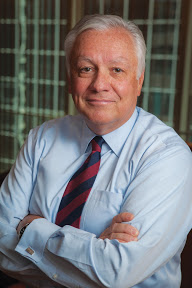Serendipity often plays a role in how the course of a life plays out. For instance, Robb Webb, chief human resources officer for Hyatt Hotels Corp., never set out to work in HR. In fact, he didn’t really plan anything. His career trajectory was almost shockingly random, one lucky appointment after another.
It began during college. He went to a government center in his native Canada to ask for help finding a job. The woman who waited on him said, ‘You look like a nice person. Why not come work for us?’ He applied and ended up helping other students find jobs.
After college he worked for the United Way, where he later caught the attention of an executive for Westinghouse Canada Ltd. who hired him away to work in HR. Nine years later, he moved into the financial services industry as an assistant vice president. After a year, his employer offered to move him to the company headquarters in California. Here Webb said his wife gave serendipity a push when she suggested he go for it. After a decade, the company was acquired by Citigroup. Webb stayed, and made more geographic moves up the career ladder before landing at Hyatt five years ago.
There’s a common thread in Webb’s career: At each stage someone recognized something in him that they wanted for their own organization, then lured him away to the next opportunity.
For instance, in the mid-90s while he was living in California, over a long dinner at an offsite meeting with his boss and the fellow who would run the company’s newest venture in Hong Kong, another opportunity dropped into his lap.
“We were discussing who could coordinate the setup and launch of the company. I turned to [my boss] and said, ‘If there’s nobody else, I’d be interested in doing it,’” Webb said. “He put his wine glass down and said, ‘That only took four hours. I was waiting for you to say that.’ I said, ‘But I’m the HR guy; I shouldn’t be the guy who’s opening up companies,’ and he said, ‘No, you’re Robb, and you’re actually the guy with the skill set that we need to open the company; don’t limit yourself by what your title says on your business card.’ It was a fascinating experience.”
Webb said part of the skill set that enables HR leaders like him to have that seat at the table is being Canadian. He said it relatively tongue in cheek, but said it’s important to understand and appreciate diversity in a new culture. When he moved from Citigroup to Hyatt, his first task was to understand the hotel business.
“If you’re going to drive change, it’s better to drive change from within,” he said. “I remember flying to Australia and reading in a book: Change is a door that can only be opened from the inside. There are a lot of people that stand outside the door pounding on it, throwing hand grenades, battering rams and the door doesn’t open because you have to do it from the inside.”
The Hyatt culture was already strong when Webb came on board, evidenced by the long tenure of many of the company’s employees. He’s a rookie compared to the 30-plus years many of his peers on the executive committee have been with the company.
But just as customers won’t come back to buy products or services from a company that doesn’t meet their needs, employees won’t stay with a company unless they feel valued. With more than 90,000 people working under the Hyatt brand in 46 countries, Webb and his team provide an experience where each individual can achieve his or her full potential and feel engaged with Hyatt and its business. Culture is key in that process. As Webb said, one can buy nice sheets, great furniture and art work when setting up a hotel, but people decide whether to return because of the human component.
“I think it was Warren Buffett who talked about the moat around your company — how big, how deep, how wide is the moat in terms of keeping competitors at bay,” he said. “The most lasting strategy to extend and deepen the moat has to do with human capital. It’s also the most difficult to copy. If a competitor looks and says, ‘Wow, Hyatt’s got all this tenure, they’ve got great culture’ and so on, ‘Let’s go hire a couple of Hyatt people, and we’ll have that culture,’ knock yourself out. It’s not going to happen. If it was that easy, everybody would do it.”
Webb said there are several building blocks that contribute to the company’s talent strategy. Global engagement is one piece — not in the sense of the annual survey, but in a 365-days-a-year context.
“We’re now coming up on five years of measuring and talking about engagement, and that’s been a small but important way to give people a common language to talk about what people expect at work,” Webb said.
Development is another piece. Last year he launched the first Hyatt Leadership Forum, custom designed after a year of interviewing people to identify goals so that participants will come away with a broader business perspective as well as things that are immediately relevant to their careers at Hyatt. Leader is in the program title, but the program is for all employees.
“If I ever heard anyone say, ‘Am I on the list?’ my answer is ‘Yeah, if you work here, you’re on the list because everyone is on the list,’” Webb said. “Everyone at every level of the company has an opportunity to develop somehow, and depending on what you do, who you are and what your interests are that will look very different.”
Development also acts as an engagement tool. Hyatt partnered with Gallup to develop a methodology and instrument to measure engagement. The tool has 12 questions, which makes it more likely that a general manager, for instance, will remember and use it to recognize others’ contributions more frequently.
“It isn’t a program,” Webb said. “We think of engagement as small e, not capital E — that it’s just the way we behave. It’s who we are as a company. It’s part of our people brand. Guests have a guest experience with us; employees should have an employee experience with us.”
In addition to its impact on the employee experience, culture also plays a significant role in how talent leaders develop the company’s global brand and properties in growth areas such as Asia, Europe and the Middle East.
For instance, to ensure that a new hotel in Vietnam has the feel, employees and values that matter to Hyatt while simultaneously opening 10 other hotels in the region, Webb and his team deploy “carriers of the Hyatt DNA” to open the hotels. Then, with the right recruitment and selection mechanisms in place — and a brand that promotes the company’s philosophy on growing the best leaders in the industry — the company can attract people who share Hyatt’s values around respect, intellectual honesty and integrity. These values are important internally and externally.
When Hyatt went public in 2009, talent strategy underwent a significant change. “When we went public I was a little naive,” he said. “I’ve been here long enough as a private company, I’d forgotten what it was like to be public. So we went public and all of a sudden a lot of stakeholders started to come at us. I had a lot of people in the religious community writing here and asking us what our position was on human trafficking around the World Cup in South Africa. How else do you answer that except to say, ‘Well, we’re opposed to it.’ I realized as a public company we can’t just know that we’re doing the right things. We need to have a framework, policies, things that demonstrate to the outside world that that’s what we believe.”
That type of wholesale move carries risk and can potentially impact how talent is viewed and strategy is executed. Lilith Christiansen, vice president and co-lead of the organization development practice at management consulting firm Kaiser Associates, said it can be easier to invest in culture and people programs in a privately held organization because there’s no need to defend the resource spending to outside investors.
“The fact that Hyatt made this transition in a successful way and we haven’t seen any bleeps in terms of news around a degradation of their service and culture says a lot,” she said. “I suspect it has something to do with how core their culture is to their success and their ability to deliver client service. It hasn’t been a place that investors have looked to make improvements or changes.”
Moving from a private, family-owned to a publicly traded company creates a different organization, said Mark Demich, vice president of leadership and organization development at Hyatt. Once the dust settled, Demich worked with Webb as well as other business and HR leaders to put together a global review process for top talent.
“We have a base criteria on how we measure leaders, a process by which we do the measurement, and then we have the actual conversation with the executive team about all of the talent at that level to understand that talent from a succession standpoint, to understand how deep that talent pool is and where leaders across the organization might come from that we hadn’t seen before for future opportunities,” he said.
Leadership at all levels is fast becoming an organizational norm. Take the front doorman of Chicago’s Park Hyatt Hotel. “I love this guy,” Webb said. “He is the absolute personification of Hyatt and a leader in the company. I want 90,000 people just like him.
“The future is providing development for those 90,000 people so they can continue to be the stewards of our culture and of our brand, so that every time they come into contact with each other, with a guest, that guest or colleague walks away feeling more engaged, more loyal and more cared about than before the interaction. I’m trying to figure out how to bottle that. I haven’t quite gotten there yet, but that’s the goal.”















